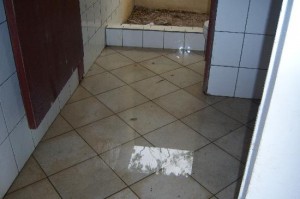Posted by Teresa on August 31, 2012 under Lease and Rental Agreements, Rents and Deposits, Tenant Credit Checks | 
 How do you say “no” to tenants who don’t meet your lease qualifications? Some landlords have a hard time doing so, especially when the applicants are persistent. Here are a few examples:
How do you say “no” to tenants who don’t meet your lease qualifications? Some landlords have a hard time doing so, especially when the applicants are persistent. Here are a few examples:
- Don denied an applicant based on weak credit. The applicant offered a bigger security deposit. Now Don is thinking of approving his application.
- Karen is a landlord in a similar situation. Her non-qualifying applicants offered to pay an entire year’s rent up front. Karen decided to accept the deal and signed the lease.
- Another landlord reports that a non-qualified couple is pleading with her to rent to them, saying they have not found another rental that meets their needs. The woman has good credit; the man has terrible credit. The landlord is thinking of putting only the woman’s name on the lease, with a substantial cash security deposit.
What is wrong with each of these decisions?
- In the first example, Don is allowing a larger security deposit to cloud his judgment. First, he lives in Massachusetts, where landlords are limited to charging no more than one month’s rent for a security deposit. Next, he is bending his own rules, which is a slippery slope. If a tenant knows he’ll cave on one aspect of the tenancy, they may be likely to push other rules, as well. Is the rent really due on the 1st? Wouldn’t it be okay to move some extra family members into the rental unit? Finally, treating every applicant equally is important to avoid charges of discrimination. Let’s say the next applicant also had bad credit and Don refused to sign a lease with them. They might charge that Don showed preferential treatment to the first tenant and that they are being discriminated against, due to their race, religion, family status, gender, age, etc.
- In Karen’s case, one might think that paying a year’s rent up front would erase any worries about the tenant’s financial situation. However, most strong tenants don’t offer prepaid rent—especially a year’s worth—because they can’t afford it. Karen should ask herself why an applicant with bad credit has that much cash laying around. Have they been scamming other landlords and living rent-free? Have they been evicted? Or are they involved in an illegal cash enterprise? The offer of a year’s worth of rent up front should be a red flag.
- In the third example, this landlord is asking for trouble. All adult residents should be put on the lease and held liable for the terms of the lease. What guarantee does the landlord have that the female will always be responsible for the rent? What if the couple breaks up and she moves out? The landlord will have a resident living in the rental unit without a lease.
Experienced landlords know that sticking to your standards and leasing only to solid tenants who meet your criteria are important steps in building a successful rental business. If denied applicants don’t hear your “no,” just say it again. And louder. And then, hold out for well-qualified tenants. Tenant screening on every applicant, with minimum qualifying credit scores, is a landlord’s best practice.
Posted by Teresa on August 29, 2012 under Housing Trends, Rental Market | 
 Whether you’re a parent of a college student or an investor in real estate, some college towns are more attractive than others. In some of the country’s hottest rental markets, landlords who own rental housing are seeing low vacancies and higher rents, while parents of college students might be finding it difficult to buy an investment property for their kids to live in while in school.
Whether you’re a parent of a college student or an investor in real estate, some college towns are more attractive than others. In some of the country’s hottest rental markets, landlords who own rental housing are seeing low vacancies and higher rents, while parents of college students might be finding it difficult to buy an investment property for their kids to live in while in school.
Buying a rental property often makes more sense for parents than paying ever-rising costs of room and board or off-campus rent. But they may be competing with experienced landlords when it comes to purchasing reasonably priced properties in today’s competitive markets.
According to Realtor.com, the following markets show promise for parents and other real estate investors:
| City |
Median Home Price |
Average Rent |
| Boston |
$334,900 |
$3,084 |
| Washington, DC |
$395,000 |
$2,637 |
| Los Angeles |
$358,000 |
$2,290 |
| Princeton, NJ |
$265,000 |
$2,056 |
| Chicago, IL |
$194,000 |
$1,630 |
| Providence, RI |
$259,000 |
$1,527 |
| Philadelphia, PA |
$234,900 |
$1,475 |
| Pittsburgh, PA |
$140,000 |
$1,122 |
| Atlanta, GA |
$175,900 |
$1,187 |
Of course, owning rental property and leasing to college students presents another set of challenges. Study the market, consult your tax, legal and financial advisors, and decide whether the pros and cons work out for your needs and personal situation.
No matter who you are leasing to, you need to protect your rental property and assets with tenant background checks. Proper tenant screening will ensure you are leasing to the best possible tenants.
Posted by Teresa on August 24, 2012 under Landlord Tips, Lease and Rental Agreements, Tenant Screening & Background Checks | 
 Most experienced landlords will tell you that tenant screening is the most important aspect of renting property. Failing to screen prospective tenants causes more problems than just about anything else. After all, each tenant is a potential liability to a landlord.
Most experienced landlords will tell you that tenant screening is the most important aspect of renting property. Failing to screen prospective tenants causes more problems than just about anything else. After all, each tenant is a potential liability to a landlord.
Thoroughly checking up on tenants’ identification, credit history, criminal background, work history and previous rental situations can give you a clear picture of the tenant you are about to trust to live with your property and among your other tenants.
Here are some basic tenant screening tips from real landlords:
- Don’t skip the tenant screening process, no matter how nice or trustworthy a prospective tenant seems.
- Treating each applicant equally will help you stay within the law. This is another good reason to screen every tenant.
- Look at credit history, criminal history, evictions, judgments, bankruptcies and sex offender status.
- Fake IDs are easy to buy or make, so check the applicant’s Social Security Number and identity to be sure they are who they say they are.
- If the applicant is local, drive by their current address to see how they live. Is there a beater car parked in the yard? Garbage strewn about? Or is it neat and clean? How it looks is a good indicator of how they will treat your property.
- Don’t judge a prospective tenant by his or her clothing, car or jewelry. A hard working, honest tenant could be dressed in dirty work clothes, while a flashy car and fancy watch could indicate someone who has plenty of money, or is simply living above his or her means.
- Beware of tenants who want to move in fast and have plenty of cash to cover rent and the security deposit. Take your time and conduct your screening process.
- Talk to previous landlords. If a tenant specifically asks you not to contact the current landlord, find out why, and talk to former landlords. Conduct the rest of your screening process and if the tenant is approved, let him or her know, and then contact the current landlord.
- Don’t base your entire approval on the landlord’s reference. Some will be anxious to get rid of a bad tenant (and give a good reference). Others will be honest.
- Take notice if the prospective tenant is late for appointments without apology or is unhappy about paying an application or screening fee.
- Ask why they’re moving.
Using these tips, along with a professional tenant screening service, can help insure that you lease only to qualified tenants. Good luck!
Posted by Teresa on August 21, 2012 under Landlord Tips, Lease and Rental Agreements | 
 Across the country, college students are gearing up for a new school year. That means securing housing, and for many of these kids, campus housing is not an option. Whether their school is short on housing, their parents are looking for ways to save from ever-rising room and board fees or they simply prefer to live off campus, they’ll choose renting a house or an apartment.
Across the country, college students are gearing up for a new school year. That means securing housing, and for many of these kids, campus housing is not an option. Whether their school is short on housing, their parents are looking for ways to save from ever-rising room and board fees or they simply prefer to live off campus, they’ll choose renting a house or an apartment.
For landlords, student tenants can be lucrative. Many college towns have limited housing available, so vacancy is rarely a problem, and getting market rent—or above—is not unusual. In addition, mom and dad are often paying the rent, so that’s not a problem, either.
On the other hand, student tenants don’t always work out. Some are on their own for the first time and don’t yet realize the impact their actions have on others. Others don’t have mom and dad to back them up, so paying rent on time could be a problem. Students can be noisy, messy, and disrespectful of you, your property and the neighbors. They may not understand the terms of the lease or think that certain rules actually apply to them.
In other words, student tenants are just like the rest of the population. Some are good, some are not so good. So is it worth the hassle to rent to students? Many landlords say “yes!” Renting to students can be a sound business decision when approached from a business standpoint, with firm management, enforcement of the terms of the lease, as well as your rules and regulations.
Ten Tips For Renting to Students
- Never rent without a lease. Go into more detail than you think you need, and review it with your prospective tenants.
- When setting rents and security deposits, take into consideration the potential for higher repair and maintenance costs.
- Get each student tenant’s parent to co-sign the lease, making them responsible for late rent, damages, etc.
- Reinforce to student tenants that unauthorized guests or roommates are not allowed. Each occupant must be on the lease.
- Screen each potential tenant. Even though the students may be young, they could have criminal histories or be a poor credit risk. Tenant screening is a must.
- Determine whether your lease will run for 12 months or for the school year, which could be fewer then 12.
- Be sure the lease states that all tenants are responsible for the entire rent. If one student moves out, his or her share is still due and payable by the remaining tenants.
- Offer online rent payment for the convenience of your tenants and fewer hassles for you.
- Contact the parents or co-signers at the first sign of trouble, whether it’s property damage, noise problems or late rent.
- Enforce your rules. When students know what to expect from you, as well as the consequences of their actions, they are more likely to behave.
Posted by Teresa on August 17, 2012 under Landlord Tips | 
 Landlords and property managers often repaint rental housing walls and ceilings between tenants. Others have carpets professionally cleaned. Many do both. But is there an obligation for landlords to perform this maintenance?
Landlords and property managers often repaint rental housing walls and ceilings between tenants. Others have carpets professionally cleaned. Many do both. But is there an obligation for landlords to perform this maintenance?
According to our clients, some tenants think there is. However, that’s just not true. There are no laws or regulations regarding how often rental property owners must clean carpets, paint walls, replace appliances, fix ceiling fans or do any other type of cosmetic upgrades.
Smart landlords know that a fresh coat of paint and clean carpets will go a long way toward attracting quality new tenants. Who wants to live in a house or apartment with scuffed-up walls, chipped paint, dirty carpets or broken blinds?
Investing a few hundred dollars in new paint and carpet cleaning is an investment in your property, not an expense you might convince yourself you can’t afford. And remember, if the carpet is not in the same condition as when the tenant moved in, you may deduct cleaning expenses from the security deposit.
What about long-term tenants? Are they required to clean carpets, or is that a service landlords should provide? Tenants are required to keep rental properties in good condition, and that includes keeping things clean. But offering to clean carpets for long-term tenants is a smart move—it makes them happy, and helps the carpet last longer.
Posted by Teresa on August 16, 2012 under Lease and Rental Agreements | 
 Situation: Water pipe starts leaking in wall behind washer and dryer.
Situation: Water pipe starts leaking in wall behind washer and dryer.
Who’s Responsible? Most likely, the landlord. It’s possible that an inside-the-wall leak won’t be noticed until water starts leaking out onto the floor, which could be hours or even days later. Landlords will generally be responsible for a leak like this, but if the tenants fail to inform the landlord immediately (ideally, in accordance with the terms of the lease), the tenant could be liable for a portion of the damages.
Situation: Tenant goes away on vacation and their house sitter leaves the tub faucet on until it overflows. Nobody notices for several hours, and there is damage to the floor, subfloor and ceiling of the unit below.
Who’s Responsible? The tenant is ultimately responsible for negligence damages to the rental property, regardless of whether or not he or she was there when it occurred. The tenant can then try to collect any loss from the house sitter. Hopefully, they have renter’s insurance. In any case, this is definitely not the landlord’s responsibility.
Situation: Toilet overflows.
Who’s Responsible? This might be another case that depends on the circumstances. If the pipes are damaged or root-clogged, it’s not the tenant’s fault. However, if the tenant clogs the toilet up and doesn’t attempt to clear the clog, it’s not the landlord’s fault.
How to Minimize the Chances of Water Damage
- Show tenants the location of the water main shut-off valve. Teach them how to turn off the main water supply. Have tenants initial a clause in the lease that they have been shown where the main is, how to turn it off, and that they are responsible for water damages if they fail to do so (unless nobody is home when the leak starts).
- Insist that all tenants carry a renter’s insurance policy. Many landlords require it, since without such protection, tenants can’t always afford to pay for repairs on the damages they cause to rental properties. If someone is injured on the property, such as from a tenant’s dog or from falling in the rental unit, the tenant’s policy will usually cover the damages, saving the landlord from having to submit a claim.
- Supply a toilet plunger in each bathroom. They’re not expensive, and can prevent many headaches. Include a clause in the lease that the tenant must agree to plunge any clogs they cause or they will be responsible for subsequent damages.
- Include in your lease that tenants must contact you immediately when they discover any water leaks. Give them an emergency contact number and make sure you are available at that number. Emphasize that tenants should not email this information—you must be notified immediately.
- Consider installing drip pans in under-sink cabinets, in case pipes ever leak.
Water leaks and overflows are no fun. Every landlord knows leaks can cause major damages, such as rotted subflooring and drywall, warped wood flooring, mold and mildew. Preventing water damages whenever possible is in every landlord’s best interest.
No matter how competitive your rents are, you need to protect your rental property and assets with tenant background checks. Proper tenant screening will ensure you are leasing to the best possible tenants.
Posted by Teresa on August 2, 2012 under Eviction, Landlord Tips, Tenant Credit Checks | 
 Experienced landlords know that being tough is an important part of their job descriptions. With the economy still suffering and unemployment still high, many prospective tenants’ credit scores have taken a beating. But should landlords take into consideration the difficult economic circumstances of many American families when deciding whether or not to approve a lease application?
Experienced landlords know that being tough is an important part of their job descriptions. With the economy still suffering and unemployment still high, many prospective tenants’ credit scores have taken a beating. But should landlords take into consideration the difficult economic circumstances of many American families when deciding whether or not to approve a lease application?
In other words, should landlords overlook lower credit scores or bankruptcy filings and try to help lease applicants?
Certainly, every situation is different. Many landlords will not budge on their credit requirements. Others look at the whole picture, and will pass a less-than-stellar credit score if the tenant has a steady paycheck that more than covers rent and other living expenses. Still others check prior evictions, and if there are none, then they will take a chance on the tenant.
And then there are the landlords who aren’t tough enough to say “no” to a prospective tenant with a poor credit history and no steady job. Whether they feel a sense of obligation or feel sorry for the tenant, they sign the lease and hope for the best. Often, they end up losing money, can’t get rid of the tenants and rack up thousands of dollars in eviction fees.
Trying to help people is noble, but it’s not a landlord’s job. A landlord’s job is to provide safe housing, to protect other tenants from potential harm, and to earn a profit from leasing property. You may hear sad stories of job loss, divorce, illness, death of loved ones and tough times. There is no doubt that it’s difficult to make a decent life for a family these days, when good jobs are hard to find.
Nobody wants to see a family out on the streets. But landlords have to be tough to protect themselves and their sizable investment. Checking tenant credit histories, conducting background checks, and sticking to your minimum qualifications will keep your rental property business strong and sustainable into the future. If you’re not tough enough, you may not have a future in the landlording business.
 How do you say “no” to tenants who don’t meet your lease qualifications? Some landlords have a hard time doing so, especially when the applicants are persistent. Here are a few examples:
How do you say “no” to tenants who don’t meet your lease qualifications? Some landlords have a hard time doing so, especially when the applicants are persistent. Here are a few examples:





 Experienced landlords know that being tough is an important part of their job descriptions. With the economy still suffering and unemployment still high, many prospective
Experienced landlords know that being tough is an important part of their job descriptions. With the economy still suffering and unemployment still high, many prospective